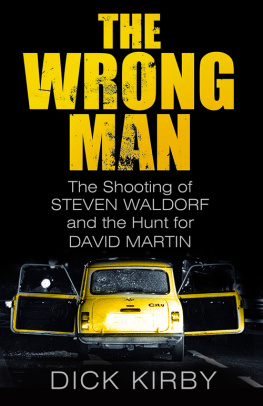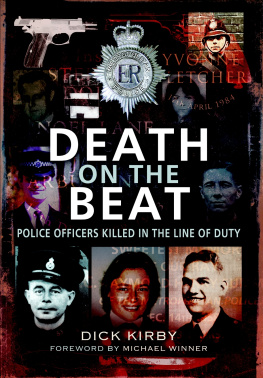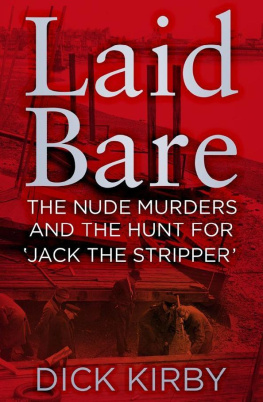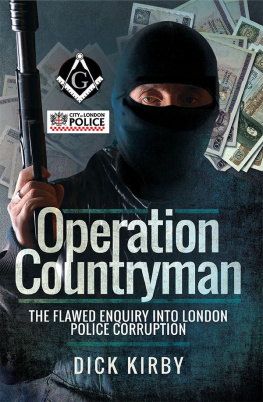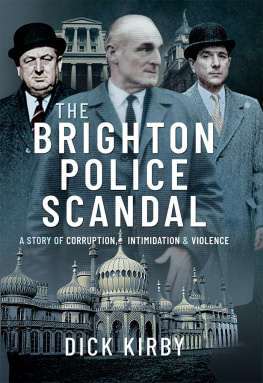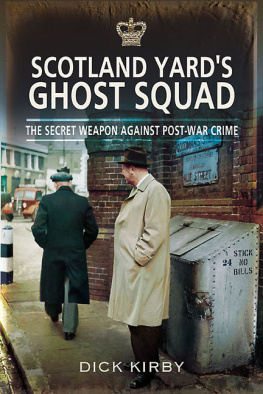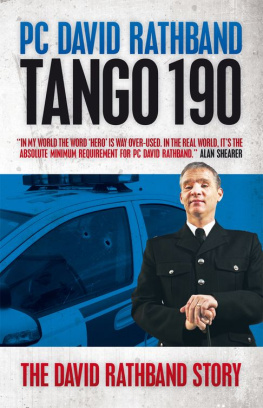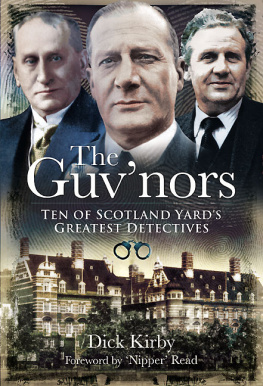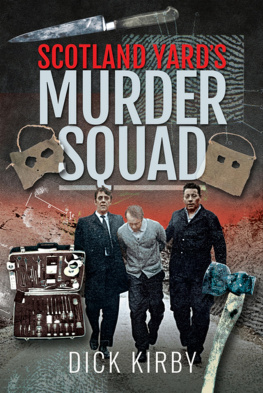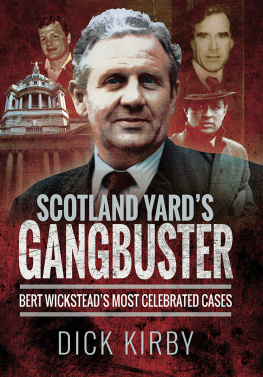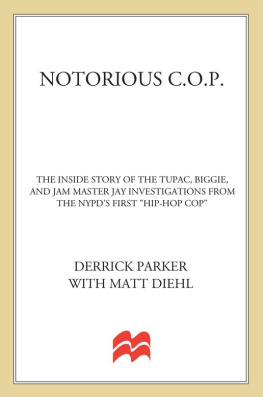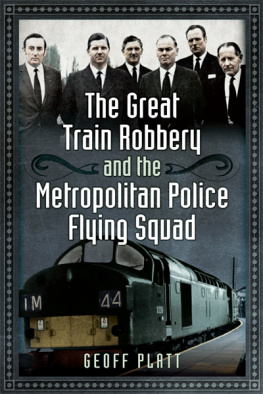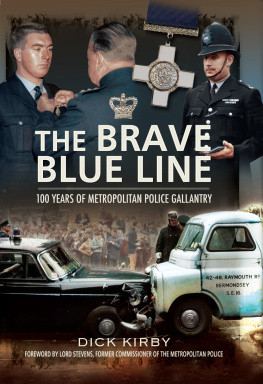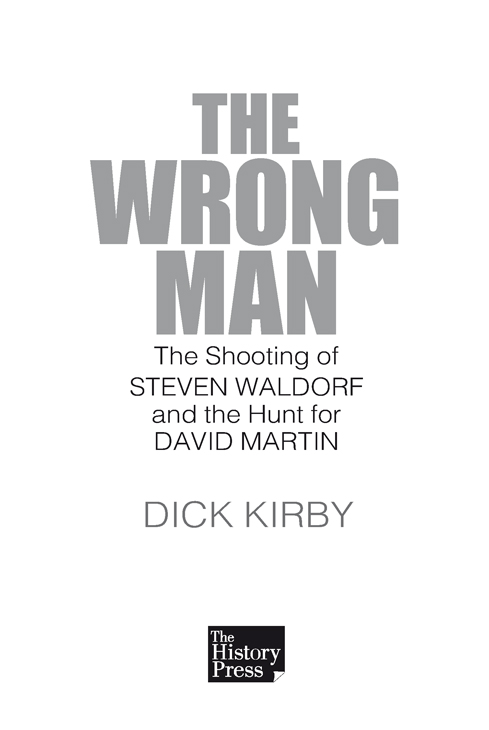
This book is dedicated to Len and Beryl Monica Waldorf,
who displayed great courage, dignity and compassion
throughout this case.
And also to Ann, who, like the Waldorf family, waited,
wondered and worried.
I should like to thank first my long-time chum, the intrepid reporter Jeff Edwards for such a splendid foreword. Next Mark Beynon, the commissioning editor at The History Press, for his enthusiasm regarding this book. In addition, Paul Bickley of the Crime Museum, New Scotland Yard; Shannon Stroud, Freedom of Information Advisor, New Scotland Yard; Bob Fenton QGM, Honorary Secretary to the Ex-CID Officers Association; and Susi Rogol, Editor of the London Police Pensioner magazine, all assisted and I am most grateful to them.
Once more, I have to thank my daughter Suzanne Cowper and her husband Steve, together with my daughter Barbaras husband, Rich Jerreat, who successfully guided me through the baffling minefield of computer land.
The following includes those who went to a great deal of trouble for me, some of whom delved into memories which must have been very traumatic, who gave most generously of their time and I am indebted to them. They appear in alphabetical order: Dave Allen, Frederick Arnold, Terry Babbidge QPM, Brian Baister QPM, MA, Roger Baldry, John Barnie, Jim Barrow, the late Nicky Benwell QPM, Alan Berriman, Colin Black, Alan Branch, Linda Brown, Colonel Markham Bryant MBE, DL, Nick Carr, Roger Clements, Steve Collins, Michael Conner, Bob Cook, Suzanne Cowper, Clive Cox, Paul Cox, Leo Daniels QPM, Robert Darby, John Devine, Neil Dickens QPM, Ken Dungate, James Finch, Peter Finch, Steve Fletcher, Jim Francis, the late Tony Freeman, Gerry Gallagher, Mick Geraghty, Martin Gosling MBE, Len Gunn, Gordon Harrison, Colin Hockaday, Steve Holloway, John Jardine, Barbara Jerreat, Len Jessup, Mark Kirby, Gus MacKenzie CFE, ACFS, Bill Miller, Alan Moss, Morgan OGrady, Martin Power, Lester Purdy, Tom Renshaw, Eddie Roach, Michael Bradley Taylor QPM, John Twomey and Tony Yeoman. My thanks for the use of the photographs goes to Linda Brown, Nick Carr, Peter Finch, Gerry Gallagher, Damian Hinojosa, John Jardine, Len Jessup, Alan Moss, the Metropolitan Police, Lester Purdy, Tom Renshaw, Martin and Maria Steward and the authors collection. Every effort has been made to trace copyright holders and the publishers and I apologise for any inadvertent omissions.
There were others who for a number of reasons either wished to remain anonymous or who were in a position to provide pertinent information and who chose not to do so. Bereft of their assistance, I have endeavoured to ensure that the content of this book is as accurate as possible and acknowledge that any faults or imperfections are mine alone.
As always, I pay tribute to my family for their never-ending love and support; in already mentioning my daughters and their spouses, I naturally include my grandchildren Emma, Jessica and Harry Cowper and Samuel and Annie Grace Jerreat, as well as my sons, Mark and Robert.
Most of all, I salute my wife Ann, who, for over fifty years, has been my dear, loving companion.
Contents
by Jeff Edwards
Former Chief Crime Correspondent, Daily Mirror , President of the Crime Reporters Association
T here is no doubt in my mind that Dick Kirby is the all-time best, most successful, and prolific author of real life books about the British police.
I like to think that, in a very small way, I helped him on that path.
I first met Dick in 1970. He had just been made a fully fledged detective constable posted to the CID (Criminal Investigation Department) at Forest Gate in East London, and I was a fluffy-faced aspiring 21-year-old crime reporter on the local Newham Recorder . In those days, unlike the situation now, reporters on local papers could get to meet police officers working at busy London police stations easily and without much restriction. Providing you were considered (in CID parlance) a good cock, who would happily stand his round in the pub and knew how to play by the rules, you were usually welcome.
I instinctively liked most of the cops I met back then. Many of them were outgoing, animated, even flamboyant characters, and I enjoyed their endless stories of life at the sharp end on the mean streets of London. I also liked their bonhomie and sense of comradeship, and their slightly jaundiced and sceptical view of life. Perhaps most of all I liked the dark dry humour and the ready wit many of them possessed.
Newham had one of the highest crime rates in the country at the time and the police were always full of stories. Some of these tales were in the best traditions of Dick Barton or Fabian of the Yard. Sometimes the tales were astonishing and full of daring and courage. Some of them were about skill or cunning where good triumphed over evil. Some of them, to be frank, were where a more acceptable sort of evil triumphed over a worse form. Some of the tales were very tall indeed and some were unprintable in a family newspaper. Grey areas abounded. I had the time of my life!
I cant remember exactly where or how I was introduced to Dick Kirby, except that he was one of those whose blend of fierce hatred of criminals, his disdain of weak and ineffectual senior officers and his loathing of devious lawyers and feeble magistrates made him stand out. With a liking for the cut and thrust of lively debate, a sharp wit and pithy observations on life in general, he was never short of an audience. He was a natural-born storyteller. We hit it off and in many ways our careers ran parallel, him moving up to some of the top crime-fighting units at Scotland Yard, while I went on to a long career as a Fleet Street crime hack.
So how do I claim to have helped give a push to Dicks later career as an author?
In the 1970s almost every police officer I knew was enthralled by the writings of the American author Joseph Wambaugh, who had for many years been a Los Angeles policeman until he turned his hand to writing. What cops everywhere loved about him was his ability to tell it like it really was. On the one hand, it was through compelling documentary stories like The Onion Field , where he drew on first-hand experience of terrible events which affected the lives of close colleagues. On the other, he wrote the candidly observed and extremely funny novel The Choirboys . Wambaugh was the real deal. He knew exactly how street cops thought, spoke, and acted, because he was one of them. In a way, he was their collective voice.
Dick Kirby was one of his greatest fans.
In 1979, as a crime reporter on the London Evening News , I received a phone call from a woman I knew who was working as a publicist for a film company. Hollywood had made a film version of The Onion Field which was to be released soon in Britain. As part of the promotion, Joe Wambaugh was coming to London. While he was here hed expressed a wish to meet some London police officers. Could I be of any assistance? You bet I could.
The choice was easy. I rang Dick and our mutual chum Peter Connor, another East London police detective, and a dinner meeting was arranged. Needless to say, Dick and Joe and Pete got on famously. And following that meeting I know Dick went on to forge a strong friendship with Joe, which endures to this day.
I have no doubt that Dick was inspired by his American counterpart to take up a second career as a writer when he retired from policing. Although their experiences were separated by the width of an entire continent and an ocean, in my opinion there is something similar in the way Joe and Dick write. You could call it shared experience, but it is more than that.
I believe it is because Dick also has the instinctive ability to translate and describe the subtle nuances in the way real police detectives, real cops on the beat working at the sharp end of law enforcement, think, speak, reason and behave.
Next page
